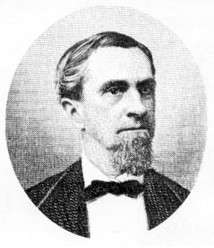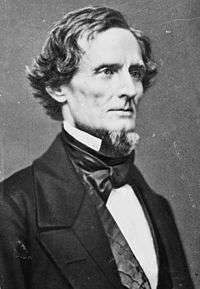George Davis (American politician)
George Davis (March 1, 1820 – February 23, 1896) was an American politician who served as the fourth Attorney General of the Confederate States from 1864 to 1865.
George Davis | |
|---|---|
 | |
| 4th Confederate States Attorney General | |
| In office January 2, 1864 – April 24, 1865 | |
| President | Jefferson Davis |
| Preceded by | Wade Keyes (Acting) |
| Succeeded by | Position abolished |
| Confederate States Senator from North Carolina | |
| In office February 18, 1862 – January 2, 1864 | |
| Preceded by | Constituency established |
| Succeeded by | Edwin Reade |
| Personal details | |
| Born | March 1, 1820 Wilmington, North Carolina |
| Died | February 23, 1896 (aged 75) Wilmington, North Carolina |
| Nationality | American |
| Political party | Democratic |
| Alma mater | University of North Carolina, Chapel Hill |
Biography
Born near Wilmington, North Carolina, George Davis attended the University of North Carolina at Chapel Hill, where he was valedictorian of the class of 1838. He subsequently studied law and was admitted to the bar in 1840. In 1848 he became general counsel of the Wilmington & Weldon Railroad. He held this position the rest of his life.
George Davis was a delegate from North Carolina to the unsuccessful Washington Peace Conference of February 4–27, 1861. He was a delegate to the Provisional Confederate Congress in 1861–1862, and was then elected to the Senate, where he served from 1862 to 1864. In December 1863, Confederate President Jefferson Davis appointed him Attorney General. He was in fact related to Confederate President Davis. He served in this position from January 2, 1864 until April 24, 1865, in the last days of the Confederacy.
George Davis was captured by U.S. forces at Key West, Florida, on October 18, 1865, and was imprisoned at Fort Hamilton in Brooklyn, New York. He spent several months at Fort Hamilton before being pardoned in 1866. He then returned to law practice in Wilmington.
Memorials

In World War II, the United States liberty ship SS George Davis was named in his honor.[1] A statue of Davis in Wilmington, North Carolina was temporarily removed by the City of Wilmington on 25 June 2020 in response to #BlackLivesMatter movement.
References
- "Liberty Ships – Part 2: EMC #s 768 thru 1551". shipbuildinghistory.com. Archived from the original on October 10, 2011. Retrieved 2011-08-13.
Further reading
- Patrick, Rembert W. (1944). Jefferson Davis and His Cabinet. Baton Rouge: Louisiana State University Press. pp. 104–120.
External links
- "George Davis". Find a Grave. Retrieved April 14, 2009.
- Short biography csawardept.com

